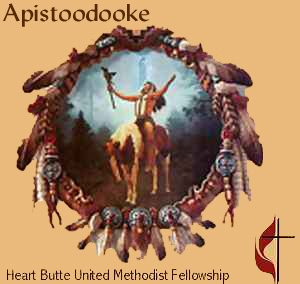Our Past
In 1959 the Rev. James Bell, as interested in establishing mission
churches outside the town of Browning, began to hold meetings at Heart
Butte. The first group met in private homes and later in a church they
established on Tribal land on Birch Creek.
Rev. Bell experimented with
different forms of liturgy and worship which employed classical elements
of the Blackfeet Culture. He reported a membership of 46 at one time, 44
of them being Native American. On July 28,1962, Rev. H.W. Anderson of
Chilocco, Oklahoma , arrived in Browning to conduct the first camp
meeting on Big Badger Creek. Rev. Anderson, a Kiowa preacher, was
sponsored by the Board Of Missions Of the Methodist Church for Field
Cultivation.
The meeting began on July 29,1962 with about 35 in
attendance. A Vacation Church School was also conducted with 24
students. The crowds grew each evening until there were about 70
attending evening services. Rev. Anderson was an exceptional preacher
and the people responded. Nine adults and three children were baptized
that week and a new church was chartered.
The name for the new Mission was discussed. Na-toOoh
(Holy Spirit) was considered until it was pointed out that this was the
name which the Old Family Catholic Mission was known. It was then
decided on the name Apistatoke meaning "God the Father", or
more commonly "Creator" . A rough sketch for an outdoor
tabernacle was drawn up and planned to be constructed by the summer of
1963. A timber permit was secured from the Blackfeet Tribe and the
process of cutting poles and tree's began. In August 1962 a Youth Work
Team from the First Methodist Church in Colorado Springs, Colorado,
arrived and helped cut and peel much of the timber. The church being the
successful bidder on the Old Swims Under School on Big Badger, repairs
began. In October 1962, the Montana Conference Board of Missions granted
$1,500.00 for the purchase of a small log building to be moved to Big
Badger and placed by the Old Swims Under School. Rev. Bell signed the 5
year permit with the Agency on July 2, 1963. The permit expired on July
2, 1968.
During the years of the existence of the church, it
was the center of social activity as well as having a religious impact.
However, after the flood of 1964, with widespread tragedy in the loss of
life and property, many families were forced to move to other locations.
The church itself only sustained water and mud damage, the homes below
it were competely washed away, as was the bridge. without the bridge
access to the church was impossible. The National Guard rebuilt the
bridge several months later. Membership and attendance began to dwindle.
Meetings were held to rekindle the original enthusiasm, but to no avail.
The remaining members decided to apply to the Browning Church for a
merger. This was approved March 3, 1974, by the Browning Board. The new
members were bused into Browning for service.
The two buildings were sold, but through the course of
time, it became difficult to travel to Browning for services, home
meetings were started again. During that time Rev. Ron Barr was the
pastor, accompanied by Agnes, Eunice and Jimmy Wells they traveled to
Helena to ask the Conference to help them get another church in Heart
Butte because it was to far to go to church in Browning, especially
during the winter months . Delma Running Crane and Nelson Bull Plume
also traveled and spoke on behalf of building a new church in the
community of Heart Butte. They also successfully applied to raise funds
through the General Board's General Advance program for both
construction of a new building and for programming Meanwhile, the
Christmas program was held in the old school building which is now the
home of the Margie Kennedy Center. Sunday School for children was held
in homes.
Land was purchased from Tom Thompson on a hillside
west of the Catholic Church and cemetery in Heart Butte. The building
was completed in Nov 1998 and dedicated by Bishop Roy. I Sano on
Nov 17, 1991.
Information on our past taken from the
Blackfeet United Methodist Parish Centennial Booklet. Faye Hoyt, spent
hours sorting through old records and materials arranging them in order
and typing the contents. Much of the material in the booklet was taken
from historical records compiled by Kathryn Schmidt and various other
records from past pastors.

